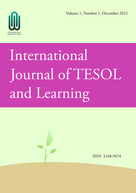


Volume 11 Issues 1-4 (2022-12-31)
Volume 10 Issues 3&4 (2021-12-31)
Volume 10 Issues 1&2 (2021-06-30)
Volume 9 Issues 3&4 (2020-12-31)
Volume 9 Issues 1&2 (2020-06-30)
Volume 7 Issues 3&4 (2018-12-31)
Volume 6 Issues 3&4 (2017-12-31)
Volume 6 Issues 1&2 (2017-06-30)
Volume 5 Issues 1&2 (2016-06-30)
The Editor is proud to announce Volume 4, Issue 1 of International Journal of TESOL and Learning (IJTL), published by Untested Ideas Research Center®, Niagara Falls, New York, USA. International Journal of TESOL and Learning is an international blind peer-reviewed refereed journal. This academic journal is dedicated to publishing investigations on new and untested ideas, and disseminating research findings that make original and significant contributions to diverse areas of TESOL and learning. This time we were able to make the current issue open access to broaden the readership.
Given the growing presence of English language learners (ELLs) in U.S. schools, much attention has been paid to the need to prepare mainstream teachers to work with such learners in content classrooms. Grounded in teacher professional development addressing the intersection of teacher beliefs and classroom practice, this mixed-method study examined the impact of a year-long teacher education program aimed at promoting changes in the beliefs of secondary content teachers regarding language learning and teaching to enhance ELLs’ academic achievement. Data were collected from pre- and post-program surveys, post-program written responses, and online discussion entries. The findings from this study indicated significant changes in teachers’ beliefs about language learning in seven key areas, including language learning through imitation, the role of age in language learning, the benefit of indirect error correction, and the importance of the simultaneous learning of language and content knowledge. Several factors attributed to such belief changes include (1) teacher education course work, (2) action research with ELLs, and (3) peer coaching. Implications for teachers of ELLs, teacher education, and future research are addressed.
The machine scoring of student writing stands as one of the hot topics in writing assessment. Companies promote these products as time- and money-saving. However, the salient question remains: Is this technology appropriate for use in the English as a Second Language writing (SLW) classroom? Administrators and second language writing professionals often seem be at odds when it comes to the use of such programs. Proponents typically express that electronic grading is of great benefit, mainly because it facilitates scoring large numbers of student essays in a short time. Scoring efficiency appeals mainly to administrators searching for cost effective ways to provide classroom writing instruction. Equally appealing to administrators is the notion that class size can be increased as the burden of grading is removed from the teacher. However, many second language writing professionals are dismayed by the notion of a computer scoring or responding to student writing. Although it is important that practitioners not rely solely on their initial response, it is natural that they express concern. However, as researchers, we recognize the need to thoroughly examine the topic, weighing both positive and negative outcomes of the use of such platforms.This issue needs to be studied from multiple perspectives so that teachers are informed about using computers to assess student writing. In this paper, the views of educators, administrators, and developers of artificial intelligence are examined with respect to the use of machines to score student writing. These programs are then situated in the context of writing assessment theory and their use critiqued in terms of pedagogical value. The paper concludes with an exploration of both the consequences and potential benefits of using these systems in second language writing classrooms as well as suggestions to help second language writing professionals work with administrators pushing for this type of assessment for instructional purposes.
Recent L2 socialization literature records are both relatively smooth and problematic socialization trajectories. Bayley and Langman (2011) outlined a call for future research allowing for a stronger understanding of how continuity and change in cultural contexts occurs, and how multilingual/ multicultural individuals experience and choose various socialization paths. This paper addresses this call by re-considering the concept of expert through an examination of the interlocking communities of practice that may exist within a single classroom. Drawing on ethnographic and discourse data from a secondary science classroom made up of both monolinguals and English language learners, we examine the ways in which the teacher and students articulate the roles of expert and novice in contexts where immigrant students from a variety of countries and language backgrounds come together with a teacher to negotiate an understanding of the complex and multiply interpretable task of ‘doing American schooling.’